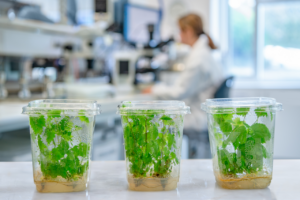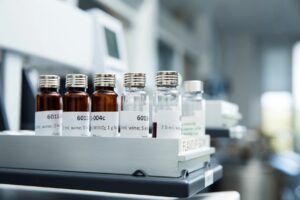Whether you’re looking to verify hygiene practices, assess contamination risks or confirm your products meet reporting requirements for food standards, our advanced testing solutions offer accuracy, reliability and peace of mind. Partner with us to safeguard your reputation and deliver products that deliver consumer confidence.
Pathogen detection
Our pathogen detection services target common foodborne and waterborne bacteria, critical for ensuring safety and compliance.
- Listeria spp. 48 hr (ELISA)-Automated (VIDAS): detects Listeria species in food and beverage samples using ELISA-based technology. Ideal for ready-to-eat products like deli meats, cheeses and pre-packaged salads. Positive results must be reported to SA Health.
- Salmonella spp. 48 hr (ELISA)-Automated (VIDAS): identifies Salmonella species in raw or minimally processed foods such as poultry, eggs and meat products using ELISA-based technology. Positive findings are reportable to SA Health.
- Coagulase positive Staphylococci (spread plate): evaluates contamination in both liquid (for example, dairy and beverages) and solid (for example, baked goods, processed foods) samples. Positive results must be reported to SA Health.
Indicator organisms
Indicator testing evaluates hygiene, production practices and contamination risks.
- Total coliforms (MPN): measures the most probable number (MPN) of coliforms, indicating cleanliness and the potential presence of harmful bacteria. Useful for both liquid (for example, beverages and broths) and solid (for example produce and grains) samples.
- Escherichia coli (MPN): measures the most probable number (MPN) of E. coli, providing direct insight into contamination risks. Suitable for liquid and solid food and beverage products where hygiene is critical.
- Enterococci (liquid): detects Enterococci in liquid samples, an indicator of contamination and poor sanitation.
Spoilage organisms
Testing for yeast, mould and Clostridium confirms product stability and quality.
- Yeast and mould: these tests quantify yeast and mould levels in food products using spread plating (Petrifilm). Often performed together for comprehensive results, this test is useful for breweries, wineries, baked goods and other products where spoilage is a concern. Not suitable for highly acidic samples.
- Clostridium (liquid): identifies Clostridium species in liquid samples, particularly relevant for vacuum-packed or canned goods at risk of anaerobic spoilage. Positive results must be reported to SA Health.
Comprehensive microbial load assessment
These tests measure total microbial counts to assess sterility and overall cleanliness.
- Standard plate count: provides a total count of colony-forming units (CFU) in liquid and solid samples. Suitable for general sterility checks, although it does not differentiate between types of microorganisms.
- Standard plate count (water):
- Standard plate count at 22°C (water) evaluates microbial growth at ambient temperatures, providing a general indication of sterility.
- Standard plate count at 36°C (water) focuses on potential pathogens by simulating body temperature conditions.
Water quality testing
These tests confirm the safety of water used in food and beverage production.
- Coliforms (membrane filter) (water):
- Coliforms at 36°C (water) tests for general coliforms as a broad indicator of water quality.
- Thermotolerant coliforms at 44°C (water) targets thermotolerant coliforms, identifying contamination and potential pathogens.
- E. coli (membrane filter) (water): directly detects E. coli, critical for identifying contamination in potable or process water.
Regulatory compliance
Positive results for certain pathogens, including Listeria, Salmonella, Clostridium botulinum and Staphylococcus aureus, must be reported to SA Health, ensuring compliance with public health regulations.

We offer tailored shelf-life testing services to food and beverage producers and suppliers.
This includes:
Lorem ipsum dolor sit amet, consetetur sadipscing
Lorem ipsum dolor sit amet, consetetur sadipscing
Lorem ipsum dolor sit amet, consetetur sadipscing
Lorem ipsum dolor sit amet, consetetur sadipscing
Lorem ipsum dolor sit amet, consetetur sadipscing
Lorem ipsum dolor sit amet, consetetur sadipscing
Lorem ipsum dolor sit amet, consetetur sadipscing
Lorem ipsum dolor sit amet, consetetur sadipscing
Enquire
Articles & case studies

The benefits of agrochemical testing for wine grape growers
Managing the health and productivity of grapevines …
Using consumer acceptance studies to deliver market-ready products
Consumer acceptance studies help manufacturers gai …
How consumer preference studies drive product innovation and customer satisfaction
Consumer preference studies help manufacturers gai …
Grapevine tissue sampling protocol for virus diagnostics
Grapevine viruses can shorten the life of infected …
NOLO spirits – opportunities for continued growth and innovation
Australia’s beverage scene is witnessing a s …Affinity Labs’ NATA-accredited laboratories perform more than 100,000 analyses per year and have serviced the Australian wine industry since 1984. The laboratories deliver high-quality cost-effective routine, export or specialist analyses, whether it is for a single sample or a large batch of samples
Richard Davidson
Project Manager





